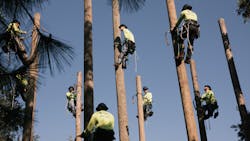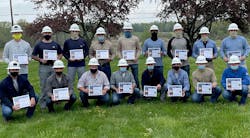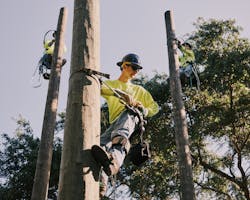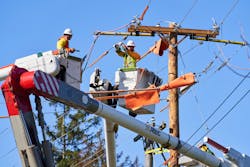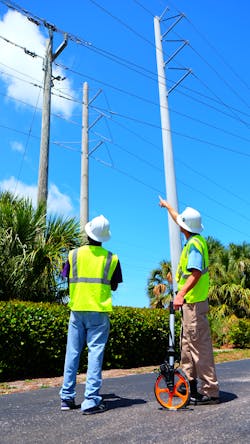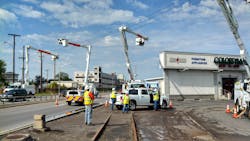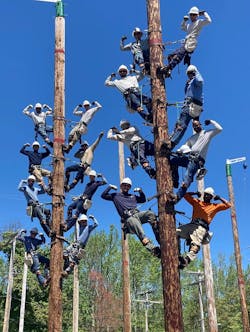Bridging the Knowledge Gap in the Line Trade
Once a journeyman lineman nears retirement, he or she has often climbed thousands of poles, worked countless storms and gained a lifetime of experience about the line trade. But what happens when he or she leaves the trade?
Electric utilities and line contractors are striving to preserve the wisdom and experience of veteran linemen and transfer it to the new generation of apprentice linemen.
Maximo Fuentes, owner of Fuentes Consulting, LLC, and a former journeyman lineman and supervisor for Sacramento Municipal Utility District, believes knowledge transfer is the most critical component in educating and training lineworkers. “You cannot transfer knowledge by just handing the workers volumes of safety and work procedures,” he said. “Those items have to be embedded in the coaching and mentoring of the workers—not only the apprentices but also the journey level workers—throughout their entire careers.”
Here are the stories of how three companies—Duke Energy Florida, FirstEnergy and BHI Energy/D&D Power—are ensuring the knowledge isn’t lost along the way as experienced journeymen retire and new apprentices come on board.
Investing in the Future of the Line Trade
Duke Energy Florida hires about 75 apprentices to replenish the line technician attrition it experiences each year.
“The industry continues to need a steady stream of talent to meet the changing needs of our business, especially replacements for workers who retire or leave the company,” said Barry Anderson, regional senior vice president, senior delivery for Duke Energy Florida.
Duke Energy Florida, which serves 1.9 million customers and 600 line technicians, follows a continuous learning model. When the apprentices come on board, they are exposed to a combination of classroom and instructor-led application training.
“We have dedicated time in the field under our senior linemen practicing the knowledge and skills of the craft on actual work that serves and restores customers,” Anderson said.
A typical line apprentice takes four to five years in this type training to become a certified line technician. To train the new workers, St. Petersburg College (SPC) opened a new Power Florida Training Center at its Allstate Center location. In collaboration with Duke Energy and PowerTown Line Construction, the center will serve as the home of SPC’s new electrical lineworker program this year.
In an effort to find local and diverse talent, Duke Energy donated $100,000 to develop the training facility, hire an instructor and purchase classroom equipment. Anderson said the partnership is mutually beneficial because it provides students with the best training while reducing training expenses.
“SPC is offering a curriculum that parallels Duke Energy’s training requirements, and the instructor is a former Duke Energy employee,” Anderson said. “Students can complete the electrical lineworker program in as little as 14 weeks while gaining hands-on, essential lineworker skills and receive additional CPR/First Aid, commercial driver and OSHA 10 training.”
From the first SPC linemen class, Duke Energy Florida has already had four new hires and expects this number to grow to 30 annually. Anderson said it will be directed to replenish attrition in the Pinellas County area. To attract local talent, Duke Energy also works with the Pinellas County Urban League.
“The program takes local candidates who want to live and work in our area and trains them for these high demand well-paying jobs available right here in their backyards,” Anderson said. “Research shows that if we hire local, they’re more likely to stay with us, here at Duke Energy, for the long term. We have also learned that candidates who are placed from other locations into Pinellas County tend to eventually leave and go back to where their families are located.”
During their training, the line techs are required to the learn how to climb poles. “In our service territory, we still have back-lot line facilities, which make it difficult to reach with bucket trucks, and require old fashioned pole climbing off gaffs attached to the line techs boots,” Anderson said. “The frequency of this type of work has diminished over the years, and therefore our line techs practice pole climbing as part of routine safety refreshers in our pole training yards.”
As Duke Energy moves into the future, the utility is working to address labor shortages in the utility industry. The company, as well as hundreds of other utilities, are members of the Center for Energy Workforce Development (CEWD), a national, non-profit consortium of electric, natural gas and nuclear utilities and their associations.
CEWD was formed to help utilities work together to develop solutions to address the expected workforce shortage in the utility industry. “The industry has worked really hard over the last decade to advance career awareness initiatives focused on technical trades, including line technicians, by leveraging CEWD’s Get Into Energy resources, which target youth, women, military and transitioning workers,” Anderson said.
At a state level, Duke Energy works with organizations like the Florida Energy Workforce Consortium. Locally with its communities, the utility works with schools like St. Petersburg College and Lake Sumter State College to help fund and support lineworker curriculum programs, in addition to working with local high schools to expose students to careers in energy. “Through these efforts, we have chipped away at the narrative that a four-year degree is the only measure of post-secondary success,” Anderson said. “While we’ve made progress, this will be an ongoing effort to continue to attract highly skilled and motivated talent to the industry.”
Training Future Linemen
Like Duke Energy, FirstEnergy has also taken a proactive approach to training the next generation of linemen. Its Power Systems Institute (PSI) two-year program combines classroom learning with hands-on training to prepare graduates for potential employment at one of the company’s 10 electric utilities in Ohio, Pennsylvania, New Jersey, Maryland and West Virginia. During their training, students spend 10 weeks in the field with utility crews to gain real-life work experience.
“The need for line workers remains constant across FirstEnergy,” said Lance Fry, manager of workforce strategy and planning at FirstEnergy. “Grid modernization has improved reliability, but there will always be a need for boots on the ground—or in air—to maintain and restore power. “
Nearly 2,500 line workers are employed at FirstEnergy’s companies. Some have been with the company for decades or have strong family ties to the industry, while others are just starting their careers after completing the company’s PSI line worker training program.
“From western Ohio to the Jersey Shore, FirstEnergy’s line workers play a key role in delivering safe and reliable power to more than six million customers,” Fry said. “In addition to maintaining and upgrading the company’s vast electric system, line workers often work in hazardous conditions to restore power to customers after severe weather events, like blizzards, tropical storms and hurricanes.”
This year, FirstEnergy’s 10 electric companies have hired 189 new PSI graduates who completed the line worker training program in May. Since 2017, FirstEnergy has hired nearly 900 new line workers into the company. Over the past two decades, PSI has helped more than 2,000 graduates launch their careers in the electric utility industry.
“The program helps fill important fieldwork positions within FirstEnergy’s electric companies,” Fry said.
The PSI curriculum requires two-and-a-half days each week spent at a community college completing academic coursework, with the remainder of the week spent at a First-Energy utility training facility to focus on safe work practices and procedures in a controlled, electrical environment. Students who successfully complete the program earn an associate degree in electric utility technology from an affiliated community college in their area.
PSI graduates typically spend about six years as an apprentice line worker before earning the position of journeyman line worker, which requires passage of a written test. As an apprentice, they are assigned to a two- or three-person line crew with a journeyman line worker and/or line leader, which are positions held by individuals who have been in the field for many years and can help train a new generation of line workers.
According to FirstEnergy Line Operations Managers Jeff Doran and Joe Grupp, when a FirstEnergy line worker retires, a fair amount of experiential wisdom leaves the company. “To bridge the knowledge gap between FirstEnergy’s seasoned and novice line workers, line operations managers assign them to work together on crews so that younger workers can glean knowledge through observation and mentorship from senior line workers,” Doran said.
Placement Challenges
A key challenge is where to place young lineworkers. “They can’t all be assigned to a particular reporting location because they must be spread among numerous facilities to receive ample time and oversight from experienced line workers,” Doran said.
FirstEnergy’s utilities strive for a one-to-one ratio or one-to-two ratio of seasoned line workers to recent PSI graduates to prepare the next generation effectively and efficiently for the job.
“New line workers are taught basic skills in the classroom, but they only learn their craft working shoulder-to-shoulder in the field with highly qualified line workers who can demonstrate why each job is unique, including how to mitigate potential safety hazards,” Grupp said. “In addition to the work experience they gain on a job site, young employees benefit greatly from the conversations and wisdom senior line workers bestow upon them through casual conversations on their way to a job site or while discussing plans and tactics for how to execute a job safely.”
For example, comprehensive job briefings or tailgate conversations are a key strategy to keep young line workers safe on the job as they tackle new tasks and build their capabilities.
“It is too late for instruction when an apprentice is in the air facing a problem or hazard that should have been anticipated and avoided,” Grupp said. “That’s why FirstEnergy’s experienced line workers have detailed pre-job conversations on the ground with apprentices, walking them through tasks precisely, move by move, always pointing out potential safety hazards along the way.”
Case in point: Line workers will be asked to hang a transformer countless times during their career. While the skill is learned through repetition, experienced line workers can point out to their younger charges why no job is alike.
“One pole may have other attached facilities that must be considered when installing a new transformer,” Grupp said. “Another may carry a three-phase line overhead that must be cautiously navigated with a bucket truck boom to lift the transformer into place. Yet another job may require climbing a pole and using rigging to haul the transformer from the ground. And in some cases, a pole may have suffered damage during a car-pole accident or severe storm that isn’t readily visible but can quickly emerge when hanging a new transformer.”
When available and practical, FirstEnergy crews use a two-person aerial-lift truck. This allows two employees to go aloft into the workspace.
“The experienced line worker can instruct the learning employee up close and assist with hands-on demonstrations in a real-life environment,” Grupp said. “Only someone who has ‘been there and done that’ can warn of those dangers not encountered in a controlled classroom setting.”
To pass the knowledge on, it’s critical to leverage the knowledge of experienced line professionals. “They take enormous pride in their craft and are dedicated to getting the job done safely,” Grupp said “They are proud of the work they do and want to pass on their knowledge to the next generation before they retire. Seasoned line workers are trusted and respected by their younger peers. They listen closely when someone who has been there countless times says, ‘Here’s what happened to me and I don’t want this happening to you.’”
As development continues throughout the FirstEnergy footprint, there is a growing need to upgrade the distribution infrastructure to handle accompanying load growth. Fewer veteran line workers remain who are proficient at reconductoring existing lines with wire larger-sized wire with more capacity. Reconductoring lines without interrupting electric service to customers is akin to changing oil in a car while it is being driven.
“Before that knowledge forever walks out the door, FirstEnergy is having those employees show the rest how to remove existing facilities and build new ones in their place and operate wire- pulling machines, as well as other key aspects of the job,” Grupp said. “Instructors set up mock demonstrations—sometimes with transmission facilities where they climb towers generally used to train PSI students—so even veteran line workers can practice skills that may be new to them in a safe, simulated environment.”
Safety is a core value at FirstEnergy. Doran and Grupp agree that when apprentices know that their leaders in the field and the classroom care about their safety, communication becomes easier and more fluid.
“Working with electricity is inherently dangerous, so understanding the safe way to perform work in the field is at the center of that knowledge transfer,” Doran said. “When leaders in the field and in the classroom are using a consistent message, the transfer of knowledge happens naturally. Having a consistent message does not happen without preparation. FirstEnergy is intentional about equipping both leaders and apprentices with the necessary skills and resources to do each job safely every time.”
Mentoring the Apprentices
In the Northeast, utility companies and line contractors are preparing for future opportunities by attracting new linemen into the local union.
“We are trying to train up and get linemen acclimated to the way we work with the demand coming up in the future,” said Rich Kroll, general foreman for BHI Energy/D&D Power. “Utilities are beefing up their infrastructure for storm hardening purposes and to be more responsive to power outages as people continue to work from home.”
When it comes to transferring knowledge to the new apprentices, he said it’s important for the veteran linemen to take them under their wing and look out for one another. “It is a team effort, and we all have to work as a team,” said Kroll, who has been with BHI/D&D for four years and in the line trade for 15 years. “We try to mentor and help them, and we make sure they go home every night with no safety problems or issues.”
A generational gap did form within the local union due to a slow-down in work from the utilities. “We didn’t put more linemen or apprentices on, so there was a lot of lost knowledge with that,” he said. “If you weren’t around with the old timers to teach you, you had new guys teaching newer guys. The hall stepped up and had more training, and now it is covered well.”
For example, a lot of the linemen with 30-plus years of experience know how to perform tasks in more ways than one. For that reason, the apprentices are moved around to different supervisors and departments from transmission to distribution to underground. Through the Northeast training apprenticeship program, they spend a certain number of hours in each department, and then when they get to BHI/D&D, they evaluate what they know and don’t know. “No two linemen are the same, and every lineman out here has a different way of doing something,” he said.
Currently, Kroll’s group has six apprentices, and company-wide, about 25 to 30 future lineworkers are just entering the trade. Oftentimes, they learn from those linemen who decide to leave the field but opt for another position.
“A lot of guys find another avenue, and they’ll still stick around,” Kroll said. “They will keep going because they like the job, and they are of the generation who doesn’t want to quit. They may retire, but they will still stay within the trade.”
For example, BHI/D&D has hired a few employees who have retired from National Grid, the local utility. “They have knowledge of the circuits, and they know the areas well, which is always a benefit,” he said.
With their skills, they can train the new line apprentices, especially those who are open to learning. “Some are closed minded and don’t want to listen, while the open-minded apprentice is willing to try things. They can pick things up and don’t have to have it repeated over and over again.”
Kroll has found that it’s often best to show the apprentices how to perform tasks and keep them moving in a positive direction. “A lot of them are hands-on,” he said. “If you take them up in the air and show them how to do it, they will get the body mechanics and repetitions down. A lot of them absorb it faster that way. Some guys can watch you work in the air, and they absorb it like a sponge. The next thing you know, they are in the air copying you. Most guys, however, need hands-on experience. You need to show them exactly how to do it and get repetition.”
A lot of the knowledge is captured through safety meetings and talks. For example, the veteran linemen put together safety briefs, in which they talk about what to do and what not to do. “We do have incidents that occur in line work, and they are learning lessons for everyone else,” Kroll said. “It is a wake-up call when you hear about something that happens, and it lets them know that there is a potential for a mistake. Many linemen spend 30 years here and then go into safety, and they are the ones writing the briefs. They want to do what they can to make sure it doesn’t happen again.”
By having the veteran linemen teach the younger apprentices, it helps to improve safety. “We must work together and try to be a fully functional team,” he says. “We need to be our brother’s keeper, watch out for our apprentices, and put in our equal amount
of effort.”
Technology’s Role in Knowledge Transfer
Over the decades, technology has transformed the energy industry, says Barry Anderson of Duke Energy. The following are ways that technology is now helping to transfer skills and knowledge from veteran linemen to new apprentices.
- Mobile navigation. “Back in the day, our infrastructure was drawn by hand – making it harder to pass things along on a specific job that our linemen worked,” he says. “Today, there are GIS systems to help map out poles and wires. Each bucket truck has a computer with navigation aids and capabilities to document key information that someone in the future can access.”
- Computerized files. Duke Energy has expanded its library of work methods and procedures. “It is to both expand the knowledge gained over years of experience and also made this information available to everyone in the cab of the truck or their mobile device,” he says.
- Launch of simulators. The company also uses technology such as grounding and high-voltage circuit simulators that mimic high consequence scenarios apprentice line workers could encounter in the field. This allows employees to be trained more quickly, in a safe and observable environment.
“Simulators provide an immersive learning environment for all levels of line workers and other utility personnel,” he said. “For instance, personal protective grounding is a highly complex and often misunderstood subject. Textbooks have difficulty illustrating fault currents on a given work zone because each distribution system is unique. The company’s use of a grounding simulator can manage several variables at once to illustrate the principles of grounding, proper work methods and even recreate specific incidents.”
Hundreds of utility employees have also received hands-on training in the company’s Distribution Simulation Lab at its Distribution Control Center in the Pittsburgh area. The room was built in 2018 and simulates a single-phase line on a distribution system to provide real-life scenarios that line workers experience in the field. In addition to new line workers, this lab is beneficial to dispatchers, engineers and distribution technicians because it helps them understand what line workers face in the field and allows them to use that knowledge when assigning and placing orders during an outage.
Four Steps to Learn a Task in the Trade
When looking back on his time as a line apprentice, Maximo Fuentes says the best way for him to learn was by using the principles from John Wooden, a famous basketball coach at UCLA. Fuentes says he still uses this principle today when he is teaching others.
- Explanation. Explain to the worker what they are going to learn and perform.
- Demonstration. Show the worker how to perform the task.
- Imitation. Have the worker demonstrate the task and correct when needed.
- Repetition. Have the worker repeat the task until it becomes second nature.
Six Tips to Train the Future Workers in the Line Trade
To transfer knowledge and skills from veteran linemen to new apprentices, utilities must invest in financial resources, identify the right people to lead the effort and fully engage the workforce, says Maximo Fuentes. Here are a few more strategies that have proven to be successful.
- Focus on on-the-job training. This is the single biggest factor in transferring knowledge to the apprentices, Fuentes says.
- Have an extensive apprenticeship program. A well-defined and developed formal education apprenticeship program should provide technical knowledge and information about the trade. “Anything other than a well-developed apprenticeship program with guidelines and time frames and strictly relying on OJT will not produce the best and most highly trained workers,” Fuentes says.
- Offer well-written, detailed and timely performance evaluations. It’s important to not only provide effective feedback to the worker, but also to receive feedback about their areas for improvement. They can also communicate about those areas where they feel that the leadership should be providing more training and information.
- Emphasize safety, training, professionalism and craftmanship in new employee training. A company should communicate that the organization strives for excellence in all areas of operations, Fuentes says.
- Document preferred work practices. To ensure that the present and future lineworkers don’t repeat the mistakes of the past is for an organization to document and preserve work practices that are time-tested, safe and productive that are used the majority of the time for everyday work practice.
- Create a near miss program. One major issue that can resolve numerous issues is having a detailed and comprehensive “near miss” program that is current, active and used in a positive manner, Fuentes says. The program should be reviewed on a consistent time frame like every safety meeting and should be a part of the apprenticeship program.
Inside Duke Energy’s Training Program
Over the years, Duke Energy has continuously adjusted its training program for incoming apprentices. For example, the utility has built very thorough and detailed work methods and procedures. These have captured and incorporated strong operational knowledge from experienced linemen, have been reviewed and adjusted from a safety lens and have been adopted in the training curriculum. Here are the levels of training in its program, according to Barry Anderson.
Apprentice: The entry-level position requires training completed in three phases, each six months apart. Among duties, workers build and maintain power lines, and install and repair streetlights, transformers, meters and other equipment. They respond to calls when equipment fails and electrical service is interrupted. New hires attend a four-week class to learn company policies, customer service training and job basics. Later phases develop skills such as climbing poles and disabling power lines.
Next step: Training occurs in eight phases, each about six months apart. Apprentices lead groundmen in building, repairing and maintaining power lines and they assist linemen.
Lineworker: On-the-scene leaders must have completed groundman and apprentice training. They must be able to troubleshoot and repair distribution circuits and equipment and must be proficient in computer programs and willing to learn new technology. Lineworkers put in long hours when bad weather causes major outages, and they often travel to other areas in the system to restore power. Before achieving journeyman status, lineworkers undergo an intense three-day qualification process that involves performing tasks, passing a written test and being interviewed by a supervisory panel.
About the Author
Amy Fischbach
Electric Utilities Operations
Amy Fischbach is the Field Editor for T&D World magazine and manages the Electric Utility Operations section. She is the host of the Line Life Podcast, which celebrates the grit, courage and inspirational teamwork of the line trade. She also works on the annual Lineworker Supplement and the Vegetation Management Supplement as well as the Lineman Life and Lineman's Rodeo News enewsletters. Amy also covers events such as the Trees & Utilities conference and the International Lineman's Rodeo. She is the past president of the ASBPE Educational Foundation and ASBPE and earned her bachelor's and master's degrees in journalism from Kansas State University. She can be reached at [email protected].
